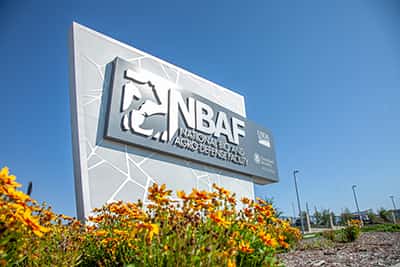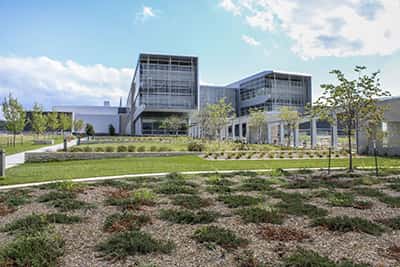
Reflecting on the one-year anniversary of the official dedication and ribbon cutting ceremony for the USDA National Bio and Agro-Defense Facility (NBAF), I am excited to share the progress we’ve made.
After years of news and updates about the facility, we took advantage of a unique time before high-level science programs started to help people have the same peace of mind that our scientists will have working in this facility. Over the past year, the communications team — with critical support from our science and operational units — have welcomed more than 800 stakeholders for tours of NBAF. Some stakeholders had a short drive to the Little Apple, some flew in from across the U.S., and yet others came from as far as Australia and the United Kingdom.
To see this facility firsthand and talk to the scientists and operational staff who work here helps people feel more confident in NBAF employees’ ability to conduct the work safely as well as take a little pride in this national and international asset. According to an anonymous post-visit survey, nearly 96 percent of visitors consider themselves a continued or even stronger advocate than before the tour.
Several stakeholders shared their positive reactions about the ‘extreme safety measures’ taken to protect the local community, including those that protect the facility from tornadoes and storms. One of my favorite comments was this: “The tour refreshed a sense of pride in United States technological and scientific leadership on the global stage. The mission can be conducted safely and remains critical to protecting U.S. agriculture, and ultimately, global food security.”
While we have thoroughly enjoyed the wonderful feedback from our visitors, the NBAF team is really focused on standing up science. As many may understand, this is not a simple process.
 Science at NBAF is starting in phases. This phased process began with low-risk, common science practices that don’t involve infectious pathogens and is moving to more advanced or mission-focused science. As NBAF is ramping up science operations, its predecessor — the Plum Island Animal Disease Center in New York — will continue protecting American agriculture until NBAF is ready to assume the center’s full mission.
Science at NBAF is starting in phases. This phased process began with low-risk, common science practices that don’t involve infectious pathogens and is moving to more advanced or mission-focused science. As NBAF is ramping up science operations, its predecessor — the Plum Island Animal Disease Center in New York — will continue protecting American agriculture until NBAF is ready to assume the center’s full mission.
Current scientific activities at NBAF are at a biosafety level-1 and -2 — which includes clean, non-infectious materials as well as moderate-risk microbes. This is similar to science work in most universities, colleges and diagnostic laboratories across the country. Activities will progress to biosafety level-3 then -4 as safety and science goals are achieved.
Every NBAF employee is needed to reach each phase’s milestones. We also need to collaborate with our colleagues at other national and international high and maximum containment laboratories for their expertise.
“We are not embarking on this journey alone,” said Dr. Robin Holland, director of the Foreign Animal Disease Diagnostic Laboratory at NBAF. “We are standing on the shoulders of giants who have been planning NBAF for decades. We feel humbled by the opportunity to carry their torch, to build on their progress, to honor their legacy, and to deliver their vision for a safer and more resilient U.S. agriculture.”
The initial science functions at NBAF have included sequencing a healthy house fly genome, seeding a cell culture, which means growing a cell line free from contaminants from frozen hamster kidney cells, and starting a fixed microscope slide library of healthy tissue. Each of these science activities are basic foundational science for NBAF’s mission to come.
“This is a once in a lifetime opportunity,” Holland said. “The complexity of NBAF is beyond comprehension. The only path forward is to work together as a team to build the foundation of a program that is larger and will outlast any of our careers.”
As NBAF proceeds through science standup phases, the facility and its procedures are required by law to undergo inspections and reviews by federal regulatory agencies. In the meantime, USDA staff continue to outline and refine the specifics of the science standup and transition from Plum Island.